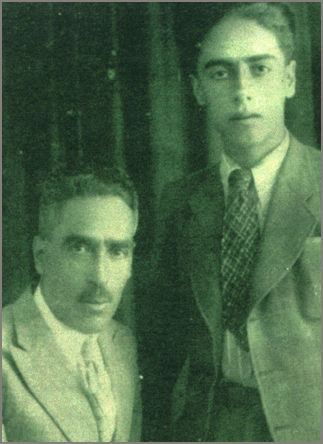Tall, Muṣṭafá Wahbī, 1897?-1949
Enlarge text Shrink text- Khrisheh, K. A prosodic analysis of ʻArār's poetics, 1987:leaf 12 (Muṣṭafā Wahbī b. Ṣālih al-Muṣṭafā al-Yūsuf at-Tal [roman.]; b. 5/25/1897 in Irbid, Jordan) leaf 23 (d. 5/24/49)
- Arar, the poet and lover of Jordan, 1999:p. 15 (Mustafa Wahbi Al-Tal; poet, known as "Arar") p. 17, etc. (b. in Irbid, Jordan, Muharram 14, 1317 H/May 25, 1899; d. May 24, 1949; teacher and attorney)
Mustafa Wahbi Tal (Arabic: مصطفى وهبي التل, romanized: Muṣṭafa Wahbī al-Tall; 25 May 1899 – 24 May 1949), also known by his pen name Arar (Arabic: عرار, romanized: ‘Arār), was a Jordanian poet, writer, teacher and civil servant, widely regarded as Jordan's most prominent poet and among the best-known Jordanian poets among Arab readers. Born in Irbid in the Ottoman Empire on 25 May 1899, Tal completed his elementary education in his hometown, later leaving to complete his high school education in Damascus. His rebellious and stubborn temperament would appear as early as his high school years in Damascus, when he would be exiled several times by the Ottoman authorities for participating in school strikes. In his adulthood, Tal would be imprisoned and exiled several times for democratic activism or for insulting high-ranking officials by the governments of the Arab Kingdom of Syria, and, after its downfall, by the government of the Emirate of Transjordan. His first job was in Karak, Transjordan, as an Arabic literature teacher. Later Tal would be appointed as Administrative Governor of Wadi Al-Seer and Shoubak in the 1920s. After earning a law degree in 1930, he would hold several positions in the judiciary before being appointed as Chief of Protocol at the Emir's Court. Tal then was laid off from his job and imprisoned for 70 days after an altercation with a Prime Minister serving during that time. This would be the latest in a series of exiles and imprisonments he faced throughout his life. Tal became desperate and his alcoholism worsened, contributing to his death on 24 May 1949. Tal's relationship with the nomadic Dom (gypsy) community in Transjordan, which are called Nawar in Arabic, influenced much of his poetry, whereas he named his only poetry collection, Ashiyyat Wadi Al-Yabis, in reference to the festive nights he spent with the Nawar and to a Nawari woman he loved. Tal found justice, equality and lack of classism among the Nawari community, which he thought was lacking in Transjordan's cities. He reflected these views in many of his poems, as well as venerating the lands of Jordan, and at other times vehemently criticizing its government's policies. He also wrote poems dedicated to criticizing British policies which supported Zionism in Palestine along with British colonial officers in Transjordan, while other poems he wrote venerated alcohol and were about women. Tal is Jordan's most celebrated poet. The country's most illustrious literary award is named after him, and his hometown of Irbid holds an annual literary festival in his name. The house where he used to live in Irbid was turned into a museum that welcomes hundreds of visitors annually. He was married four times, two of which ended in divorce. He had ten children. His eldest son Wasfi Tal was Jordan's Prime Minister for several tenures during the late 1960s and early 1970s until his assassination in 1971.
Read more on Wikipedia >
 Personality
Personality










